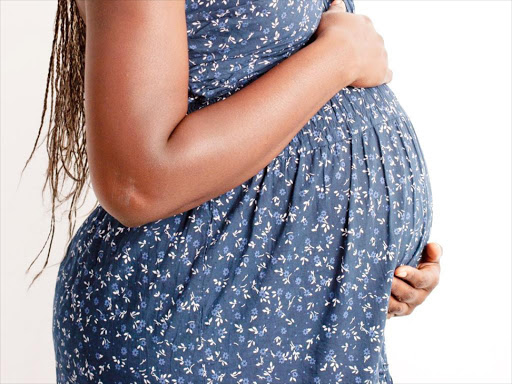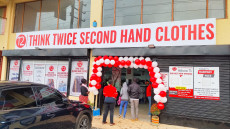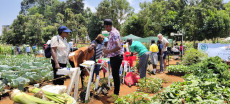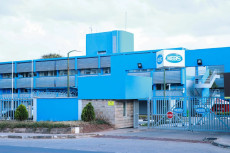- Handling emergency unsafe abortion cases is still a challenge to many health facilities due to the lack of specialized departments and equipment that can reduce instances of deaths in patients.
The burden of unwanted pregnancy, the relentless agony of morning sickness, and the overwhelming dread of bringing a child into a harsh and unforgiving world have driven countless young women to resort to dangerous, illegal abortions.
The Kenyan constitution, Article 43, states that every person has the right to the highest attainable standards of health, including reproductive health, but this is never the case in most local facilities.
In the quiet serenity of a village nestled among the rolling hills of Gwassi and the whispering wind from the innocent lake lives the poignant tale of Apondi (pseudonym), a 20-year-old who unexpectedly finds herself in the family's way.
Living the consequences of unsafe sex, Apondi's life was abruptly faced with a daunting crossroads: the choice to secretly undergo an abortion, a decision she made to shield her parents from shame and the weight of unexpected motherhood.
Overwhelmed and weak, Apondi asked her sister Akoth, who was barely 19, for support; she made her vow never to tell anyone about her situation as she figured out the abortion plan.
Apondi said that she recalled her aunt's story on that fateful morning, which ruined her life. Apondi could not come to terms with the awaiting wrath of her father's anger.
"The thought of being disowned by my own father killed me, I remember when my aunt got pregnant in her college days, and my dad ceased taking care of her," Apondi reiterated.
With support from her younger sister, Apondi put herself together to begin the dreadful 2-kilometre journey to the health facility for an abortion, where the doctor in charge did not talk her out of it.
"At the price of KSH.5,000 the doctor did not hesitate to do the abortion, in fact he even gave us testimonials of girls that had successful abortions in his hands, so I had to trust that I'll be okay after that," Apondi remembered.
In a dark, tinny room filled with dusty papers and an old bed, is where the doctor injected Apondi and gave her some drugs to take home as he pocketed the KSH.5,000.
Taking her vulnerable sister back home, Akoth was sad to see her sister in pain, and yet she could not share the news with anybody else. In her mind, she had just funded a murder and risked her sister's life.
"That night, my sister started experiencing pain and bled so much. For a minute, I thought she could die in the night, so I kept monitoring her,” Akoth narrated.
Getting better, Apondi felt relieved, and the thought of pregnancy left her mind, the truth was still hidden in plain sight, but she could not see it.
"A week later I started vomiting again and I did another pregnancy test which turned out positive that is when I went back to the hospital for another abortion," Apondi lamented.
Going through the same pain of unsafe abortion again, Apondi felt relieved a week later and did another test that was not clear whether she was pregnant or not; this time round, she started receiving threatening calls from the doctor demanding more for the second abortion attempt.
Six months later, Apondi was still pregnant despite having an abortion twice at the local facility. She had to break the news to her mother because everything had failed, and she had no way out.
Being a delicate process, not ignoring the fact that the baby was grown, a third abortion was too risky, but they had to go through with it.
"My mother took me to a house in Madhare where the final abortion was done, this time round I was not injected, scissors and other tools were inserted into me and I could feel my baby being cut into tiny pieces, at that time I could smell death from a distance," Apondi said.
This time round, Apondi was sure she was no longer pregnant, a secret that was buried along with her lifeless child in Madhare.
While young girls like Apondi opt for unsafe and cheap abortions, the Constitution of Kenya 2010 clearly outlines circumstances under which abortion may take place, which is often not followed since it does not also outline when abortion is legal.
Article 26 of the constitution boldly states that abortion is illegal unless it is an opinion from a trainee health officer, an emergency case, or the mother is in danger, and nonetheless, young girls abort every day with the help of quack greedy doctors.
In most backstreet clinics, unsafe abortions take place contrary to the Constitution and the Health Act 2017. Greedy doctors perform unsafe abortions, exposing young girls to haemorrhage and even infertility.
According to a report by the Ministry of Health, 464,690 young girls between the ages of 10 and 24 abort annually, which leaves 2,600 women dead and 21,000 others hospitalized for complications from incomplete abortions.
Homa Bay is one of the most burdened counties with the highest number of teenage pregnancies, presenting 23%, which is higher than the national average of 15%.
According to Dr Julius Ochieng' Ondigo, who is an Obstetric Gynecologist at the Homa Bay Teaching and Referral Hospital, the post-abortion care services offered due to unsafe abortions are caused by unwanted pregnancies, with the majority being teenagers.
"Unwanted pregnancies has been the leading cause of unsafe abortions, most of the cases we get are teenagers between ages 13 and 20 every week the referral hospital records an average of 2 cases of girls in need of post abortion care,” said Dr. Ondigo.
He also noted that they receive 6 to 8 patients between the ages of 13 and 40 who have safe abortions weekly.
In his eight years of experience, Dr Ondigo said they mostly handle incomplete abortions where patients come in when they are already infected, dehydrated or even anaemic.
"We have had emergency cases where the patient is brought and they are too weak, in this case we do blood transfusions and also put them under strong antibiotics to stabilize them since they are already septic," said the Gynecologist.
There are a series of tests done to determine the extent of the unsafe abortion damage; in the outpatient clinic, examinations are done to determine the circumstances under which the abortions occurred.
"We normally do a hierogram test to check blood levels and confirm whether the patient is septic. Then we access levels of damages and discharges. In severe cases where the womb is perforated, we do surgeries to evacuate the uterus and stop haemorrhage,“ explained Dr Ondigo.
Unsafe abortions have also been a major contributor to maternal mortality and even infertility in women. Deaths are always a result of excessive haemorrhage.
"Excessive blood loss because of hemorrhage is the major cause of death, we get circumstances where the patient has become too anemic, and some also die because of sepsis. Cases of perforated womb have also been a cause for death though rarely," Dr. Odingo said.
According to Dr Ondigo, bacteria attacks in the womb and the fallopian tubes due to an unsterilized environment lead to blockage of the fallopian tubes, which causes infertility.
"In most cases, unsafe abortions happen in unsterilized environments, and this may cause ascending bacteria that attack fallopian tubes. Patients also suffer post abortion sepsis, which, if not managed, leads to pelvic inflammatory diseases which also block the fallopian tubes," added the gynaecologist.
Handling emergency unsafe abortion cases is still a challenge to many health facilities due to the lack of specialized departments and equipment that can reduce instances of deaths in patients.
Dr Ondigo affirmed that the hospital lacks enough blood for anaemic patients. Lack of equipment like scans still poses a major drawback in their fight to save lives, forcing them to borrow from partners and support NGOs.
"The referral hospital is privileged to have trained nurses who handle the abortion cases, however there is always a shortage of blood, antibiotics for septic patients and sometimes getting scans take time which puts our patients in grave danger," the gynecologist lamented.
According to the Ministry of Health National Guidelines for Quality Obstetrics and Prenatal Care, every patient receiving post-abortion care should access family planning counselling and services.
Abortion poses several traumas to the patients, both psychological and emotional; Dr Ondigo shared that apart from the medical care, the department is also charged with the mental well-being of young girls.
“After medication we give guidance and counselling to the emotionally weak girls, where we teach them how to overcome trauma and we even give advices on various family planning methods to promote safe sex amongst our young girls,” added Dr.Ondigo.
Promoting safe sex practices in society is not just a matter of health but also a critical step towards preventing the dire consequences of backstreet abortions.
Access to comprehensive sexual education, affordable contraception, and confidential healthcare services empowers individuals to make informed choices about their reproductive health.
By prioritizing safe sex practices, we mitigate the need for risky alternatives like backstreet abortions, which endanger lives and perpetuate cycles of poverty and inequality.
Upholding the availability of safe and legal abortion services alongside comprehensive sexual health education ensures that women can access the care and support they need without resorting to dangerous measures.
It is imperative to advocate for policies and initiatives that promote safe sex practices and support marginalized communities in accessing comprehensive reproductive healthcare, thereby safeguarding their health and well-being.








